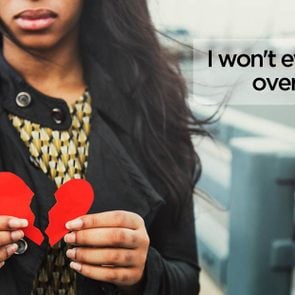What’s an Emotional Detox and Do You Need One?
Updated: Mar. 16, 2022
Purging toxic feelings is important for better mental health. Here's how to start an emotional detox if you're feeling off and worn out.
Cleanse your mind
Are you ever so overwhelmed by your thoughts or responsibilities that you feel stuck in quicksand? Or, so emotionally out of control that you are easily triggered and often overreact to situations that typically you wouldn’t find stressful? Maybe, you’re feeling withdrawn or wrestling with childhood trauma or rejections from the past that are affecting your present and future. (Here’s how to set boundaries for your mental health.)
If you’re feeling like this, it may be time for an emotional detox. (Try these herbal remedies for fatigue and exhaustion.)
Most of us know what a physical detox is (think the infamous green juice cleanse), but we don’t hear nearly as much about how to engage in emotional detox and the possible benefits of doing it.
Here’s what you need to know about an emotional detox and how purging toxic feelings can lead to better mental health.
What’s an emotional detox?
Clinical psychologist Barbara Ford Shabazz, director of the psychology program at South University in Savannah, Georgia, and founder of Intentional Activities, describes an emotional detox as engaging in behaviors and activities that “eliminate emotions that directly interfere with optimal mental health maintenance and are tied to our physical health.”
Sounds easy, right? Shabazz warns that disconnecting emotionally can be harder than it may appear.
“When we’re part of a culture that values being busy over slowing down to ‘sit’ with ourselves, existing on autopilot tends to render us depleted, distracted, and disconnected, mainly from ourselves,” cautions Shabazz.
Although there are no quick fixes when it comes to processing, unpacking, or releasing the trauma, stress, and burnout that we carry with us from day to day, it is doable.

Tips for how to do an emotional detox
Here are 14 suggestions to consider when preparing for an emotional detox.
Get real
Shabazz says that the best way to begin addressing the cause of your stress is to be honest with yourself about what may be causing your mental or emotional discomfort or strain. She says, “acknowledgment is the best way to begin addressing the root and clearing the path to healing.” (Here’s why toxic positivity can be negative.)
The heart and mind are connected to the body
Although there are differences between a physical and emotional detox, one characteristic inherent in both is eating healthy and nutritious foods and moving your body. Before starting your emotional detox, clean up your eating habits and get your blood flowing, suggests Candice Williams, a licensed professional counselor and an athletic counselor in The Ohio State University’s athletics department.
These changes can look different for each person. You might decide to start slowly by removing soda from your diet or limiting the number of times you eat out.
Others might opt for a more aggressive change by going vegan or committing to a vigorous excise regimen five days a week. Either way, Williams stresses the connection between the body and the mind. If we eat well, we tend to feel better physically and when we feel better physically that helps increase mental clarity. (Find out what happens to your body when you relax.)
Make a plan before you start your plan
Williams recommends making a plan of action for your detox before you officially start. Work on your plan in incremental amounts over a few days leading up to the start of your detox.
Williams also recommends setting realistic and practical goals that take into consideration your day-to-day responsibilities and obligations that are non-negotiable. This might also be a great time to begin identifying and reflecting on what might be causing your stress or strain so that you can tailor your plan according to your specific needs.
Clear your mind and the rest will follow
According to Shabazz, “there is nothing like a good brain dump to declutter your mind.” Without editing or deep thought, she recommends writing down whatever comes up and says this is key to identifying your unconscious needs and some of the conflicts you may have never verbalized.
After engaging in your brain dump, read through your thoughts and identify patterns. “Be honest with yourself about the consistent patterns you find. Forgive yourself. Emote. Ask what it is, when it comes up, who or what is causing it, why it’s significant, where it’s coming from, and plan how you will choose to release what’s keeping you stuck,” says Shabazz.
Be present
As difficult as it might be for some of us to not allow our minds to wander to the many tasks we have to complete or the day’s event, Williams stresses the importance of remaining present and focused on your plan while detoxing. (Suffer from poor sleep? Here’s how decluttering helps insomnia.)
Kick social media to the curb
Or at the very least, use it responsibly. After creating your plan or engaging in a brain dump, you might find that social media is a trigger for you like it is for many others. Williams says that taking a break from social media can be highly beneficial during an emotional detox.
Constantly watching the lives of others and the inevitable comparisons that we make between ourselves and the lives we see on social media can have a significant toll on our mental and emotional wellness over time. And if for whatever reason, you find that you cannot completely rid yourself of social media for the entirety of your cleanse, limit your use and make sure to only visit sites and pages that bring you peace. An alternative to social media use could be to journal. (Follow these therapists’ tips for how to start a journal.)
Identify and limit vices
Comfort-seeking behavior is a part of human nature, especially, during times of stress or duress. Overly engaging in things like food and alcohol are the most common vices because they are also the easiest to access. But consistently engaging in these behaviors to dull the pain doesn’t lead to the healing you are truly seeking. (These stress management tips can help you along the way.)
Making matters worse, overindulging can also lead to serious issues down the road such as overeating, excessive weight gain, alcoholism, and overall poor health. So, before you reach for that glass of wine after an argument with your partner or a bag of chips after a long stressful day at work, stop. Recognize the urge and engage in an exercise of self-reflection about what is triggering that desire. (Here’s how to avoid emotional eating during times of stress.)
Ask for help
Identify those in your life who you trust and don’t shy away from reaching out to them when you need their assistance. The same is true for speaking with a mental health professional. We have all needed someone at some point in our life. There is no shame in asking for help. (Learn how to find a therapist.)
Forgive yourself and others
Many of us hold onto grudges against ourselves and others, which can slowly eat away at our mental and emotional wellness. If this sounds vaguely familiar, give yourself some grace. Recognize that we all make mistakes.
This is not to suggest that you shouldn’t hold yourself and others accountable or that you must maintain relationships with those who have caused you extreme pain. Forgiveness is not an allowance. Forgiving yourself and others is the practice of acknowledging the upset, processing those emotions, and then arriving at a place where you can accept whatever happened, make peace with it, and release it.
Wallow in the “good”
Just like any other detox, once you remove the impurities that once weighed you down, you have to replace them with the stuff. Find the people and spaces that serve you and fill you up and wallow in them a bit. Be intentional about engaging in activities and interacting with people who make you happy.
Of course, everything you engage in will not leave you thrilled over the moon and every interaction you have with other people will not leave you with hearts in your eyes. However, try your best to have those positive experiences as often as you can. Williams recommends using a gratitude journal to keep yourself focused and constantly grounded in a place of peace and appreciation.
(Check out these positive quotes to boost your mood.)

What’s a post-emotional detox?
Once you have completed your emotional detox, hopefully, there will behaviors, thoughts, perspectives, and attitudes that you will not want to return to.
Just like with a diet or a physical detox, if you go back to eating a pint of ice cream for breakfast, you very well may find yourself in the same situation again. This why it’s important to also have a maintenance plan that you work on that is realistic.
Tips during a post-emotional detox
Here are a few other things to keep in mind post-detox.
Repairing reduces repeating
Make sure that you continue making intentional efforts toward repair and healing post-detox. “What we don’t ‘fix’ doesn’t just go away. It may not be at a level of conscious awareness, but always finds a way to the surface when we’re activated or triggered. Don’t let the ease of denial keep you from ongoing identification and necessary growth,” says Shabazz. (Try this 10-minute quick anxiety fix.)
Continue asking for help
According to Shabazz, “support is a verb.” She recommends continuing to seek connections with a trustworthy network of family, friends, and professionals who can objectively nourish and help you to maintain balance as you work through emotions when things come up. (Here’s how friends relieve stress and help us cope.)
Don’t be afraid to press restart
If you find yourself back at square one, like many of us do, don’t be afraid to press restart. In fact, it might be a good idea to schedule an emotional detox in your schedule weekly, monthly, or annually.
Next, practice some self-care and learn how to carve out “me time.”




















